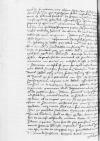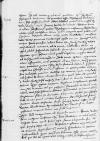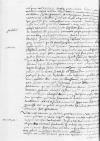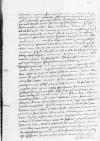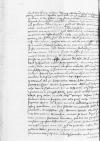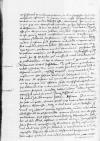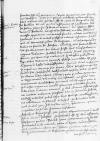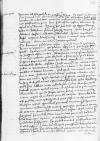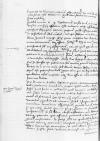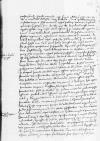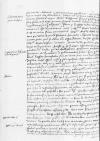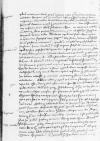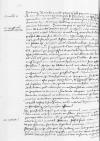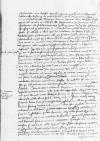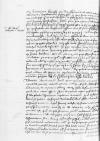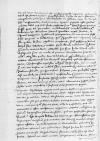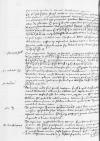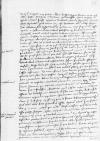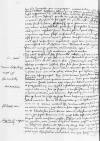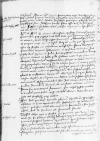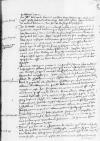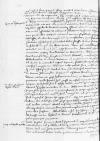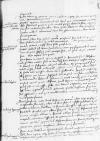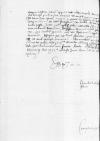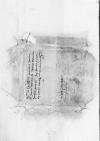Letter #2974
Cornelis DE SCHEPPER to Ioannes DANTISCUSBinche, 1546-06-12*
English register:
De Schepper is happy about the arrival of Dantiscus’ long-awaited letter [IDL 6698 (letter lost)]. He received it in London near the end of Lent. He analyses the reasons why its delivery was delayed. He sees its content as being unfavourable towards the English and their King [henry VIII]. He thanks Dantiscus for accepting his apology [for the three-year break in his letter-writing].
He lists recently deceased people whose integrity is worth copying in these difficult times: René [de Châlon], Prince of Orange, Godschalk [Ericksen] and [Cornelis van] Zegherscapelle.
De Schepper reports the return of his stepson Matthias Laurijn from Constantinople. Following Dantiscus' request he characterises imperial envoy and secretary Gerard Veltwijck.
De Schepper responds to Dantiscus' request that he send him books directed against Martin Bucer's doctrine. He writes that after the doctrine’s official condemnation by the Roman Catholic Church and an imperial ban on bringing in books containing it, no one in the Low Countries is dealing with the subject any more. Therefore he is only sending Dantiscus De restauranda religione by the Parisian theologian Herman Lethmaet, who presents the topic in two volumes though he had announced there would be as many as thirty-six.
De Schepper describes the juicy details of the anonymously published biography of Bucer, lamenting the heretic’s long time of hiding among Christians [i.e. Roman Catholics] and his destructive influence on Hermann von Wied, Bishop of Cologne. He thinks that if Hendrik of Nassau were still alive, he would be shocked by the Nassau family’s connection to the Wied family. In De Schepper’s view, Bucer is all the more harmful because he has more followers than Martin Luther himself.
De Schepper expresses his delight with Filippo Archinto’s theological books. He knows about the Cracow edition published under Dantiscus’ patronage. De Schepper met with Archinto in Milan and in Nice. He intends to write to him, all the more so since Dantiscus wrote to him about the support Archinto provided to Dantiscus’ cousin in the case against the former Canon of Ermland, Alexander Sculteti. De Schepper criticises Sculteti’s conduct in reading of banned and frivolous books. He notes a similarity between Sculteti and members of the Łaski family, who have a bad influence on the inhabitants of Frisia and on some of De Schepper’s compatriots.
De Schepper reports that Maximiliaan van Egmond-Buren has regained his health and is due to arrive from Frisia at Queen Mary’s court. The rumour that he had been conducting levies for the King of England turned out to be false, because England and France are readying for a peace treaty.
De Schepper sends Dantiscus greetings from his friends, who were glad to hear that Dantiscus was still alive. Among them he lists Claude Bouton, Hendrik van Witthem, Petrus Clericus, Pierre de Boissot, Lord Silly [Jean III de Trazegnies] and Ioannes a Loven.
With reference to the congratulations that Dantiscus extends to his homeland for achieving peace, De Schepper is concerned as to whether this state will last in view of the envy of the country’s neighbours, especially the French. He is glad it is the Habsburg Netherlands that rule over the mouth of the Rhine, and the Duchy of Guelders from where enemies armed by France usually attack. After the defeats of the last war, the people of the Low Countries fortified the Duchy of Luxembourg, which was regained with some difficulty, and the County of Hainaut. The Emperor [Charles V] has also taken care of the previously neglected military training of the Low Countries’ young men.
De Schepper notes that the enemies of the state and religion who spread the false rumours which Dantiscus heard about the situation in the Low Countries have been subdued.
De Schepper responds to Dantiscus’ doubts as to whether the Emperor is still able to establish peace in view of the escalating conflict between France and England over Boulogne-sur-Mer. He agrees with Dantiscus’ view that all the spoils plundered both from the tomb of St. Thomas in Canterbury and from the monasteries would not satiate the soldiers’ greed. He outlines the negotiations concerning a joint military operation by the Emperor and England against France, in which he participated as an envoy to England. As a result of these, the Emperor made peace with France with the consent of England, which is still at war. De Schepper does not yet know the results of the missions which were sent by the German Protestant princes to the Kings of England and France with the aim of establishing an alliance against Emperor Charles and King Ferdinand. De Schepper encountered the envoys, Johannes Sturm and Johannes Sleidanus, who pretended not to recognise him and did not want to exchange greetings. De Schepper criticised them publicly.
De Schepper is happy about Dantiscus’ praise of his stable, almost homely lifestyle at Queen Mary’s court. He claims that he has to be ready to undertake diplomatic duties, especially dangerous and poorly paid ones, but admits that there are fewer of them now and they are less fatiguing than they used to be. He declares that he will make every effort to serve Christianity well.
De Schepper reciprocates Dantiscus’ greetings for his children by sending his best wishes to his friend’s nephews. At the request of Dantiscus’ acquaintances from the imperial court (including Lord of Courrières [Jean de Montmorency], the Marshal of Silly [Jean III de Trazegnies] and Hendrik Stercke), De Schepper intercedes for Dantiscus’ daughter [Juana Dantisca] and extensively outlines the situation of her husband Gracían [de Alderete], briefly writing about her mother [Isabel Delgada]. He criticises Dantiscus’ lack of interest in his daughter’s fate.
To Dantiscus’ remark that, contrary to the horoscope that foretold he would live a short life, De Schepper is now a grandfather, he replies that the prediction was based on an incorrect date of birth. To satisfy his friend’s curiosity, he declares that since he started serving rulers in other ways, he has completely abandoned astrology.
De Schepper agrees with Dantiscus’ negative opinion of Jan Łaski jr., who is active in territories across the River Ems. He has dared to spread his false teachings in Cologne and its environs, but does not go across the river [i.e. to the Habsburg Netherlands] for fear of punishment – a year earlier some Frenchmen from Strasbourg were burned at the stake there. Despite this, some from among the Netherlandish nobility (a.o. eldest son of Charles of Burgundy, whom Dantiscus knew) have been deluded by them and together with their families have emigrated to Strasbourg, Geneva and Zürich. De Schepper also describes two wealthy noblewomen from Twente in Overijssel who preferred to be burned alive rather than abandon the teachings of Menno Simons.
De Schepper points out that apostates, especially those infected with Anabaptism (including Polyphemus [Felix Rex] and Gnapheus), are fleeing from the Low Countries to Prussia, seeking the protection of the Duke [Albrecht]. In the person of the Duke, in De Schepper’s view, the Poles have raised a snake who is harming the German nobility.
De Schepper outlines the religious situation in France where, in his view, atheism is spreading. He seeks the reason for this in France’s frequent alliances with pagans, in wars against Christians and in the corruption of morals. He describes the overwhelming influence of the King’s mistress, Lady d’Estampes, on state affairs. He praises, as being just, the sentencing to death by burning at the stake of godless Frenchmen, including the scholar Étienne Dolet who slandered the Emperor, the Germans and the Spaniards on many occasions. He mentions that many Frenchmen are emigrating to Germany for religious reasons. He notes that the way in which the King of France [Francis I] treats Lutherans depends on his current relations with the Pope [Paul III], the Emperor and the German princes from the Schmalkaldic League.
Regarding the religious situation in England, De Schepper notes that although religious ceremonies have not been changed, he agrees with Dantiscus that church discipline and the primacy of the Pope have been rejected.
De Schepper reports on the worsening situation in Scotland. England’s supporters have killed the Cardinal of St. Andrews [David Beaton], who had ruled the country since the death of the King [James V Stuart].
De Schepper responds to Dantiscus’ explanations regarding his stay at the royal court for the wedding [of Sigismund II Augustus and Elisabeth of Austria]. He advises his friend not to regret the hardships this involved because, despite suffering illness and the disfavour of “Juno” [Bona Sforza d’Aragona], he gained the favour of the old King [Sigismund I]. He also suggests that Dantiscus bid the court farewell for good and devote himself exclusively to the affairs of Prussia, his true homeland.
De Schepper describes the failure of his peace missions in England. He reports that he passed on Dantiscus’ greetings to Bishops Cuthbert Tunstall and Stephen Gardiner but did not meet with Archbishop Cranmer, who leads a different life from the other two and is of a different faith. Therefore Schepper is not surprised at how he treated the boy from Lithuania [Georgius Rogenellus] and that he did not reply to Dantiscus’ letter.
As requested by Dantiscus, he explains the marital affairs of the King of England, listing his progeny and describing the background, connections and ultimate fate of all six wives.
De Schepper reports in detail on the actions of Stanisław Lasota, a courtier of the young King of Poland [Sigismund II Augustus], at the imperial, Netherlandish and English courts; Lasota introduced himself as a royal envoy and tried to arrange a marriage for the young King and organise international trade relations, while in reality he was a semi-private person without any credentials, a fact which was finally discovered.
De Schepper states that the English are not interested in an alliance with faraway Poland (which would be strengthened by an appropriate marriage). He asks to be recommended to the Polish king [Sigismund I] and for information about the new chancellor [Tomasz Sobocki], whom he does not know.
De Schepper is worried by unfavourable news from the Kingdom of Hungary, including the downfall of the powerful families there and the Hungarians’ readiness to submit to Turkish rule. The situation in Poland seems to him to be much better, as long as the old King lives. However, he is worried by news of Polish youths being sent off to study in Wittenberg, widespread trafficking in lay and religious offices, spreading hatred of the clergy, and favourable attitudes towards the Duke in Prussia and supporters of the Turks in Hungary. All this is leading to the Christian Republic’s doom. Polish diplomatic efforts in France and Italy, of which De Schepper has been informed from Rome, seem silly because he knows well how fickle the French and the Italians are.
He repeats (enigmatically) rumours of Bona’s efforts to regain her Italian income.
He thinks the proposal to call the Royal Prussian Estates to the Polish Crown [with the aim of incorporating Prussia], as presented to the King [Sigismund I] at the assembly, is harmful and introduces discord in the country. On the other hand, he favours the idea of Prussia supporting the Crown in the defence against the Turks.
Regarding the information from Dantiscus about newly appointed bishops, De Schepper writes that of the people listed, the only one of whom he has heard is the late [Primate of Poland, Piotr] Gamrat, whom he initially took for an Italian on the basis of his name (Gamaratini) and his being a protégé of the Queen [Bona]. He writes very unfavourably about him while extolling (based on Dantiscus’ description) the current Bishop of Cracow, Samuel [Maciejowski].
He comments on the news Dantiscus sent him about the situation in Hungary. Ferenc Bebek and Brother George [Utješenović], who are fighting a civil war with each other, are known to him and he considers them to be devious criminals. He recalls the well-founded concern about Brother George once felt by King John [Zápolya]. He notes the difficult position of Isabella Jagiellon.
De Schepper discusses the political consequences of the death of the Duke of Orléans [Charles II of Valois]. His birth gave the French hope that he would rule Hungary and destroy the Turkish Empire. De Schepper had also been told this by the Bishop of Tarbes [Antoine de Castelnau]. However, the Duke of Orléans’ achievements were limited to supporting the Lutherans and seizing part of the Duchy of Luxembourg for a short time. De Schepper guesses that when he wrote of certain plans that the Duke of Orléans’ death had destroyed, Dantiscus meant his intention of marrying the widow [Isabella Jagiellon] of King John [Zápolya] and obtaining Hungary from the Turks as a fiefdom; since the Turks were allegedly supposed to hand over Buda to the son of King John (though this ultimately did not come to pass), this would have been an effective way of taking power in Hungary. Though the Poles had been told that he aspired to this in order to turn them against the Emperor, in fact he coveted the power over Italy or the Low Countries.
De Schepper notes that everyone who wants peace among Christians mourns the death of Queen Elisabeth [of Habsburg], as her marriage was a guarantee of friendship between Poland and the Kingdom of Bohemia and Hungary. He asks about the cause of Elisabeth’s death.
De Schepper explains that the source of his concern over the negotiations between the Polish Queen [Bona Sforza] and the King of France relates to the benefits which stand to be gained from these talks by the Protestants who are forming a league against the Emperor and the Roman King [Ferdinand Habsburg]. He questions the sense of Bona’s efforts to secure the hand of the French princess for her son, since the King of France is vying for the hand of the Emperor’s son for his daughter.
De Schepper describes the Emperor’s travels, the state of his health, and his meetings with the princes of the Reich (the Landgrave of Hesse [Philip I der Großmütige] and the Elector Palatine [Friedrich II of Wittelsbach]) on the eve of the Diet in Regensburg. He is counting on an agreement being reached and on a joint operation against the Turks.
The Duke in Prussia’s four-month stay in Germany does not bode well, in De Schepper’s view.
De Schepper presents different opinions on the imprisonment of the Duke of Braunschweig [Heinrich II]. Some blame the Protestants, others claim that Heinrich’s gullibility was his downfall, and others still accuse Moritz, Duke of Saxony.
De Schepper outlines the Emperor’s difficult position in Germany. He states that the Protestants are striving for civil war, disregarding both the supremacy of the rulers and the danger of an attack from France and the Turks.
De Schepper has no fresh news about Spanish affairs, Hernán Cortés, Philipp von Hutten or the others who travelled to America.
As requested, De Schepper lists those progeny of rulers who are as yet unmarried: still living is the Emperor’s grandson [Carlos of Asturias] born of Philip’s wife [Maria Manuela of Portugal] who died in 1545. After the death of Madeleine [of Valois], the King of France is left with one daughter, Margaret [of Valois]. Madeleine’s late husband, the King of Scotland [James V Stuart], had another daughter [Mary Stuart] by his second wife [Mary of Guise], and she will probably reign in Scotland after Edward [VI Tudor]. The Emperor has two daughters. The elder [Mary of Austria] is to marry King Ferdinand’s son, while the younger [Joanna of Austria] has been promised to the eldest son [João Manuel] of the Portuguese king [John III of Portugal]. The King of Portugal has two eligible daughters and one son. The Dauphin of France [Henry II of Valois] has a three-year-old son [Francis II of Valois] and a six-month-old daughter [Elisabeth of Valois].
Georg [of Austria], Bishop of Liège, was pleased to receive the letter from Dantiscus that De Schepper gave him after returning from England, and promised to provide a reply, but their contact was interrupted when De Schepper was sent on a mission to Zeeland in connection with rumours that French ships had arrived at Walcheren Island. De Schepper sends reciprocated greetings and best wishes from the Lord of Praet. He has not met any more of Dantiscus’ former companions from the imperial court.
[Francis van der] Dilft is in England and suffering from gout and a cold.
Like Dantiscus, De Schepper wrote the present letter in parts, during breaks between household and court duties. He extends greetings to Dantiscus’ brothers and sisters as well as his nephews.
De Schepper is overseeing the construction of the castle in Ghent. The building served as a Benedictine monastery for hundreds of years.
De Schepper sends news of Dantiscus’ acquaintances and friends: his former landlord in Ghent [Arendt Sturm], Michiel De Vriendt, the Lord of Schardauw, the Lord of Heule, Karel Utenhove, the abbot of St. Peter’s Monastery, Dantiscus’ servant Triest, Iacobus de Scorisse, Adolphus de Scornaco, and Levinus Panagathus [Algoet], and also Wolfgang Haller, the Duke of Aarschot [Philippe II de Croÿ], Antoon van Bergen, the Archbishop of Köln [Hermann von Wied] and the Cardinal of Mayence [Albrecht von Hohenzollern].
He describes the prosperity of the Duchy of Guelders, loyal to the Emperor, and the organisation of the army in the area. He informs Dantiscus that there is peace in the Duchy of Milan, which is governed on the Emperor’s behalf – after the death of the previous governor, the Margrave del Vasto [Alfonso d’Avalos] – by Ferrante Gonzaga.
De Schepper does not know what to expect from the Imperial Diet or the Council of Trent. It is said that several French bishops have made their way to Trent, and from the Low Countries the Bishops of Cambrai [Robert de Croÿ] and Tournai [Charles de Croÿ].
De Schepper has no news of Margrave Johann Albrecht [of Brandenburg-Ansbach]. As for Mariangelo Accursio, he has heard that he was at the imperial court as an envoy from l’Aquila and that he has started a family.
He moves on to replying to the postscript attached to Dantiscus’ letter. As requested, he recommended Dantiscus to Queen Mary and read her excerpts from his letter.
He states that the abuses (insolentia) of Spanish soldiers are well-known everywhere, but this is normal for troops and nothing can be done about it.
He has learned from Gerard Veltwijck that the Turkish expedition against Georg Utješenović’s supporters (Georgiani) has been postponed and that the Sultan [Suleiman] seems to be striving for peace. The Sultan has concluded a one-year truce [with the Emperor] because Veltwijck did not consent to a longer one.
De Schepper is surprised that the young Polish king is striving to take over the annates. Perhaps he was encouraged by the example of the King of France, but the Pope will not let his income be taken from him. De Schepper sees this kind of idea as dangerous.
De Schepper has not yet met with Count [Maximiliaan van Egmond]-Buren; he has only sent him a letter. He hopes to speak with him in person soon. He confirms receipt of the booklet by Archinto together with the items placed inside, and sends thanks on behalf of his wife, children and cousin. He is not sure if the appearance of the piece of silver conforms to that of the original silver coins for which Christ was betrayed. He asks Dantiscus to explain the matter. When he has a free moment he will compare the coin’s weight with that of other specimens.
De Schepper praises the lamentations (naeniae,) written by Dantiscus in German, as combining scholarly knowledge with the spirit of Christian piety and being quite different from specimens of this type of work written by the renegade clergy who have taken refuge with Albrecht, Duke in Prussia. He disagrees only with Dantiscus questioning the loyalty of the people of Guelders to the Emperor. De Schepper surmises that this deeply unfair opinion is based on a single example of an ex-priest who fled Guelders for Ducal Prussia.
De Schepper mentions that he has not received Piotr Gamrat’s encomium from Gdańsk. He asks to be sent this piece, as he is curious to know some details about the deceased archbishop, whom he compares to Sardanapalus.
De Schepper calms Dantiscus’ anxiety at news of the Emperor’s sickness – it was only a mild attack of gout.
De Schepper justifies his delayed reply to Dantiscus’ letter with the fact that after returning from England he journeyed across the Low Countries. He found Queen Mary in Binche, which had been given to her by the Emperor together with adjacent lands. The Queen has built a fortified residence and intends to spend the rest of her life there. Being situated in the [borderland] Hainaut province, Binche was not fortified earlier, making it an easy target for French attacks during the last war, to the extent that it was suggested that the residents should transfer the relics of St. Ursmar elsewhere – something which, however, they refused to do. Today in the Low Countries people are waiting for news from the Diet of Regensburg, where it is said that few princes are to be present.
De Schepper describes the terms of the peace concluded recently between England and France, though these have not been officially announced. Boulogne-sur-Mer is to remain in the possession of England for eight years. After that the King of France may buy it back for 2,000,000 crowns, in the meantime paying England a tribute and calling upon Scotland for peace. The King of England has sent a cardinal to France to substitute for him as godfather to the King’s granddaughter [Elizabeth of Valois]. However, from the fact that the King of England continues to fortify Boulogne-sur-Mer and is building new strongholds in its vicinity, De Schepper concludes that he does not intend to return this territory. De Schepper describes a duel that took place in France between two Spaniards, one serving the King of England, the other serving the King of France. He reports that Queen Mary has built the fortified town of Mariembourg in Hainaut, right on the border with France and opposite a French stronghold.
| received 1547-01-08 Manuscript sources:
Prints:
| ||||||||||||||||||
Text & apparatus & commentary Plain text Text & commentary Text & apparatus Excerpts concerning Dantiscus' travels
Reverendissimo et excellentissimo Praesuli orig. Presuli⌈PraesuliPraesuli orig. Presuli⌉ et Domino, domino
Reverendissime et excellentissime praesul orig. presul⌈praesulpraesul orig. presul⌉, domine et pater ex animo honorandissime et observandissime.
Salutem.
Optatissimas cf.
Facies written over m⌈mss written over m⌉ temporum talis fuit, qualem eam depinxi, atque utinam non et haec tempora novam nobis invehant, ita sese disponere praeparareque orig. preparareque⌈praepararequepraeparareque orig. preparareque⌉ videntur. Sed quid facias? Ferenda nobis sunt omnia.
Ceterum, quia scire desideras orig. desyderas⌈desiderasdesideras orig. desyderas⌉, quisnam hic sit  UUB, H. 155, f. 119v
UUB, H. 155, f. 119v
Ceterum  UUB, H. 155, f. 120r
quem aliquamdiu orig. aliquandiu⌈aliquamdiualiquamdiu orig. aliquandiu⌉[19] in Hebraicis
UUB, H. 155, f. 120r
quem aliquamdiu orig. aliquandiu⌈aliquamdiualiquamdiu orig. aliquandiu⌉[19] in Hebraicis
Scriptum porro ab eo adversus  UUB, H. 155, f. 120v
abiecta persona[22] exutaque larva in publicum. Imprimis autem
UUB, H. 155, f. 120v
abiecta persona[22] exutaque larva in publicum. Imprimis autem
In summa, si talis fuit  UUB, H. 155, f. 121r
chero.[25]
UUB, H. 155, f. 121r
chero.[25]
Est autem econtra, quod plurimum gaudeam, reverendissimum scilicet dominum
cf.  UUB, H. 155, f. 121v
animorum[29] aestu. De quo aliquando latius.
UUB, H. 155, f. 121v
animorum[29] aestu. De quo aliquando latius.
Amicis, qui adhuc supersunt, nominatim vero domino
Quod
Reliqua harum ditionum confinia, utpote in  UUB, H. 155, f. 122r
coaluit[36] iuventus nostra et armis et animis.
UUB, H. 155, f. 122r
coaluit[36] iuventus nostra et armis et animis.
Neque profecto miror flagrantibus bellis praedictis orig. predictis⌈praedictispraedictis orig. predictis⌉ horrenda ad vos de nobis esse perlata ab hostibus religionis nostrae nostrisque, atque ea plerumque nobis adversa, nam id potissimum optabatur a quamplurimis, ut etiam in ripa
Quod autem non satis intelligere te scribis, cum orig. quum⌈cumcum orig. quum⌉ bellum inter  UUB, H. 155, f. 122v
res cum orig. quum⌈cumcum orig. quum⌉[39] eos fefellerit,
UUB, H. 155, f. 122v
res cum orig. quum⌈cumcum orig. quum⌉[39] eos fefellerit,
Quin et acephali illi
Vitae meae rationem quod laudas, precipue orig. praecipue⌈precipueprecipue orig. praecipue⌉ vero quod vitae genus privatum quoddam in aula serenissimae  UUB, H. 155, f. 123r
ad facienda[41] imperata sive terra sive mari proficiscendum, sive res pacis sive belli tractandae, plerumque vero imponuntur humeris meis periculosa, quae nemo libenter amplexetur. Nam si quae alia sunt, unde commodi oriundi spes ulla est, facile sufficiuntur, qui haec obeant. Quod in nullius odium invidiamque dictum velim accipias, ab iis enim viciis Dei clementia orig. claementia⌈clementiaclementia orig. claementia⌉ me alienum fecit reddiditque sorte contentum, quae mihi cum vicinis communis est vindicatque orig. vendicatque⌈vindicatquevindicatque orig. vendicatque⌉ a contemptu et miseria plus certe elargita, quam optare aliquando potuissem. Minores tamen mei nunc sunt corporis labores quam prius, quod peregre diu versatus opinionem meis de me praebuerim domi quoque posse utilem civem esse.[42] In qua enitar, ut me contineam, nihilo segnior futurus, si quis alibi usus mei esse poterit ad
UUB, H. 155, f. 123r
ad facienda[41] imperata sive terra sive mari proficiscendum, sive res pacis sive belli tractandae, plerumque vero imponuntur humeris meis periculosa, quae nemo libenter amplexetur. Nam si quae alia sunt, unde commodi oriundi spes ulla est, facile sufficiuntur, qui haec obeant. Quod in nullius odium invidiamque dictum velim accipias, ab iis enim viciis Dei clementia orig. claementia⌈clementiaclementia orig. claementia⌉ me alienum fecit reddiditque sorte contentum, quae mihi cum vicinis communis est vindicatque orig. vendicatque⌈vindicatquevindicatque orig. vendicatque⌉ a contemptu et miseria plus certe elargita, quam optare aliquando potuissem. Minores tamen mei nunc sunt corporis labores quam prius, quod peregre diu versatus opinionem meis de me praebuerim domi quoque posse utilem civem esse.[42] In qua enitar, ut me contineam, nihilo segnior futurus, si quis alibi usus mei esse poterit ad
De  UUB, H. 155, f. 123v
indubitantissimeque[43] arbitror, utcumque nonnumquam secus es suspicatus
neque memoria excidit, quod olim ad me scripsisti in demortuae scilicet locum te eam habere neque filiam arbitrari, quae inconsulto patre corporis sui cuiquam fecit potestatem. Ceterum haec apud me non omnino probantur, libere loquor. Quid enim commisit
UUB, H. 155, f. 123v
indubitantissimeque[43] arbitror, utcumque nonnumquam secus es suspicatus
neque memoria excidit, quod olim ad me scripsisti in demortuae scilicet locum te eam habere neque filiam arbitrari, quae inconsulto patre corporis sui cuiquam fecit potestatem. Ceterum haec apud me non omnino probantur, libere loquor. Quid enim commisit
Faciunt hoc mecum nonnulli, apud quos nondum excidit recordatio dulcissimae consuetudinis tuae,  UUB, H. 155, f. 124r
me sciscitatus,[47] eane orig. ea ne⌈eaneeane orig. ea ne⌉ comperta haberem et ad te scripsissem.[48] Cum orig. Quum⌈CumCum orig. Quum⌉ autem constanter assererem de
UUB, H. 155, f. 124r
me sciscitatus,[47] eane orig. ea ne⌈eaneeane orig. ea ne⌉ comperta haberem et ad te scripsissem.[48] Cum orig. Quum⌈CumCum orig. Quum⌉ autem constanter assererem de
Redibo nunc ad cf.  UUB, H. 155, f. 124v
in ea condicione orig. conditione⌈condicionecondicione orig. conditione⌉[54] temporum aliud, quod libentius ille amplectebatur, uti nosti, et nihil non mihi praestandum orig. prestandum⌈praestandumpraestandum orig. prestandum⌉ erat nullaque non subeunda ignominia, quo afflictis rebus principum, quibus tunc inserviebam, pro mea exiguitate opitularer. Coactus sum itaque ingenuum illum animum meum honestiorumque studiorum amantem eo vilitatis demittere atque in eo veluti plaustro consenescere, donec sublato, cuius gratia haec fiebant, auctore orig. autore⌈auctoreauctore orig. autore⌉ usus mei aliis in rebus esse coepit orig. cepit⌈coepitcoepit orig. cepit⌉. Quod simulatque obtigit, avidissime a me abieci calculos omnes dedidicique, quod prius non parvis laboribus mihi paraveram et dedidicisse gaudeo adeo, ut vix elementa artis nunc memoria teneam Deo Omnipotenti curam rerum mearum commendata, cuius arbitrio staturum me casurumque scio. Ceterum genesis illa,[55] quae celeriorem vitae exitum portendebat, quamquam a me esse mea tunc putabatur, didici tamen postea ex
UUB, H. 155, f. 124v
in ea condicione orig. conditione⌈condicionecondicione orig. conditione⌉[54] temporum aliud, quod libentius ille amplectebatur, uti nosti, et nihil non mihi praestandum orig. prestandum⌈praestandumpraestandum orig. prestandum⌉ erat nullaque non subeunda ignominia, quo afflictis rebus principum, quibus tunc inserviebam, pro mea exiguitate opitularer. Coactus sum itaque ingenuum illum animum meum honestiorumque studiorum amantem eo vilitatis demittere atque in eo veluti plaustro consenescere, donec sublato, cuius gratia haec fiebant, auctore orig. autore⌈auctoreauctore orig. autore⌉ usus mei aliis in rebus esse coepit orig. cepit⌈coepitcoepit orig. cepit⌉. Quod simulatque obtigit, avidissime a me abieci calculos omnes dedidicique, quod prius non parvis laboribus mihi paraveram et dedidicisse gaudeo adeo, ut vix elementa artis nunc memoria teneam Deo Omnipotenti curam rerum mearum commendata, cuius arbitrio staturum me casurumque scio. Ceterum genesis illa,[55] quae celeriorem vitae exitum portendebat, quamquam a me esse mea tunc putabatur, didici tamen postea ex
Subiungis nostrates plurimum vobis
Siquidem vel written over ...⌈... illegible⌈...... illegible⌉ vel vel written over ...⌉ illi, vel alii haud melioris farinae nonnullos ex nobilitate nostra adeo deliros orig. delyros⌈delirosdeliros orig. delyros⌉ reddidere, ut relictis bonis fortunisque omnibus, quas amplas possidebant, cum uxoribus et
 UUB, H. 155, f. 125r
sororibus sese[59] alio proripuerint, utpote
UUB, H. 155, f. 125r
sororibus sese[59] alio proripuerint, utpote
Qui autem ad vos confugiunt ex nostris aut monachi sunt fugitivi, veluti
Atheismus, de quo scripsi, per  UUB, H. 155, f. 125v
tam foede infamiterque[60] tractat superinscribed⌈tractattractat superinscribed⌉, ut foedius nihil infamiusque excogitari queat. Huic in nobis lacerandis tam bene de
UUB, H. 155, f. 125v
tam foede infamiterque[60] tractat superinscribed⌈tractattractat superinscribed⌉, ut foedius nihil infamiusque excogitari queat. Huic in nobis lacerandis tam bene de
Periere eo suplicii genere plerique in
At econtra, ubi
Nec desunt voces, aliquando orig. aliquamdo⌈aliquandoaliquando orig. aliquamdo⌉ etiam regiae, ni  UUB, H. 155, f. 126r
UUB, H. 155, f. 126r
De
In  UUB, H. 155, f. 126v
Superest, ut divinam oremus clementiam orig. claementiam⌈clementiamclementiam orig. claementiam⌉, ut nos de numero faciat esse electorum, quod eam facturam omnino spero confidoque.
UUB, H. 155, f. 126v
Superest, ut divinam oremus clementiam orig. claementiam⌈clementiamclementiam orig. claementiam⌉, ut nos de numero faciat esse electorum, quod eam facturam omnino spero confidoque.
Subdis mirari te, quod
Quae de mea in  UUB, H. 155, f. 127r
pertinacia[64] continuandi belli, quae sub hoc tempus primum remitti coepit orig. cepit⌈coepitcoepit orig. cepit⌉, credo exhaustis
UUB, H. 155, f. 127r
pertinacia[64] continuandi belli, quae sub hoc tempus primum remitti coepit orig. cepit⌈coepitcoepit orig. cepit⌉, credo exhaustis
Miror vero, quod ignotum tibi sit, quo tum coniugium inierit serenissimus  UUB, H. 155, f. 127v
Gallicae praeter orig. preter⌈praeterpraeter orig. preter⌉[66] vernaculam apprime peritam.
UUB, H. 155, f. 127v
Gallicae praeter orig. preter⌈praeterpraeter orig. preter⌉[66] vernaculam apprime peritam.
Et successit, uti divinabas de aliquo vestrate in  UUB, H. 155, f. 128r
proficiscendi,[67] standi, morandi etc., simul addens sese nonnulla illi in mandatis dedisse utrique dicenda. Cuius quidem clausulae, ni fallor, vigore sese oratorem
UUB, H. 155, f. 128r
proficiscendi,[67] standi, morandi etc., simul addens sese nonnulla illi in mandatis dedisse utrique dicenda. Cuius quidem clausulae, ni fallor, vigore sese oratorem
Nec multo post venit in  UUB, H. 155, f. 128v
permoveri oblatione matrimoniorum apud vos, cum orig. quum⌈cumcum orig. quum⌉ non desint vicina magis eoque commodiora. Habet enim
UUB, H. 155, f. 128v
permoveri oblatione matrimoniorum apud vos, cum orig. quum⌈cumcum orig. quum⌉ non desint vicina magis eoque commodiora. Habet enim
Siquidem, uti nosti, qui nunc sunt a consiliis
De miserabili  UUB, H. 155, f. 129r
plius mirer,[72] cui illius gentis ingenia nota sunt, si tamen vocari merentur
UUB, H. 155, f. 129r
plius mirer,[72] cui illius gentis ingenia nota sunt, si tamen vocari merentur
Praetereaque orig. Pretereaque⌈PraetereaquePraetereaque orig. Pretereaque⌉ regina Poloniae magnam filio caesaris(?) promisisse pecuniam pro ducatibus Italicis(?) encrypted ⌈regina Poloniae[78] magnam filio caesaris(?)[79] promisisse pecuniam orig. pequniam⌈pecuniampecuniam orig. pequniam⌉ pro ducatibus Italicis(?)[80]regina Poloniae magnam filio caesaris(?) promisisse pecuniam pro ducatibus Italicis(?) encrypted ⌉ non in nepotem ex nata sed regem iuniorem Poloniae secluso rege Romanorum encrypted ⌈nepotem ex nata sed regem iuniorem Poloniae[81] secluso ms. seclupo(!) ⌈seclusosecluso ms. seclupo(!) ⌉ rege Romanorum[82]nepotem ex nata sed regem iuniorem Poloniae secluso rege Romanorum encrypted ⌉ idque instinctu quorundam orig. quorumdam⌈quorundamquorundam orig. quorumdam⌉ non ignotorum.[83] Quae an vera sint, nescio, feruntur tamen, uti dixi, et me non latet non parum veri subesse. Haec pro mea libertate.
Enimvero, quae in
Quamquam sane non improbarem, si ingruentibus tam magnis
Ex pontificibus vestris, quos mihi nominas, novi neminem, auditum tamen mihi fuit nomen cuiusdam  UUB, H. 155, f. 130r
argumento[85] non deesse
UUB, H. 155, f. 130r
argumento[85] non deesse
Iuvat iterum redire ad Hungarica, quando ad cetera orig. caetera⌈ceteracetera orig. caetera⌉ epistulae orig. epistolae⌈epistulaeepistulae orig. epistolae⌉ tuae capita videor mihi abunde orig. habunde⌈abundeabunde orig. habunde⌉ respondisse, atque ad id imprimis, quod de civili inter  UUB, H. 155, f. 130v
atque
UUB, H. 155, f. 130v
atque
Mortem  UUB, H. 155, f. 131r
Hac enim voce tenebriones[92] illi misero popello imponunt. Sed non laetatus est diutina victoria, quandoquidem
UUB, H. 155, f. 131r
Hac enim voce tenebriones[92] illi misero popello imponunt. Sed non laetatus est diutina victoria, quandoquidem
Mortem  UUB, H. 155, f. 131v
ego animae quietem[93] a Deo omnium benefactore apprecor.
UUB, H. 155, f. 131v
ego animae quietem[93] a Deo omnium benefactore apprecor.
Ex iis, quae supra scripsi, credo te nunc intelligere, quid voluerim, cum orig. quum⌈cumcum orig. quum⌉ scriberem me arbitrari vestrates vicinorum amicitias externorum pollicitationibus esse praelaturos orig. prelaturos⌈praelaturospraelaturos orig. prelaturos⌉. Sciebam et written over au⌈auetet written over au⌉enim tunc, quid moliretur regina Poloniae encrypted ⌈regina Poloniaeregina Poloniae encrypted ⌉,[94] quid item rex Franciae encrypted ⌈rex Franciaerex Franciae encrypted ⌉[95] quamque id nullo vestro bono fieret, sed ob id tantum, ut omnia perturbarentur, nec me latebat devi<o>s a fide et protestantes per medium regis Franciae vobiscum tractare super liga contra caesarem et regem Romanorum encrypted ⌈devi<o>s a fide et protestantes per[96] medium regis Franciae[97] vobiscum tractare super liga contra[98] caesarem[99] et[100] regem Romanorumdevi<o>s a fide et protestantes per medium regis Franciae vobiscum tractare super liga contra caesarem et regem Romanorum encrypted ⌉,[101] ne quid deesset ad complementum maliciae, et, ut gens vestra civilibus inter Christianos bellis assuesceret, quoties illis videretur, possent ex vestratibus habere equitum levis armaturae sex milia, modo in singula capita sex daleros profunderent. In quo et consensisse regem iuniorem Poloniae. encrypted ⌈consensisse[102] regem iuniorem Poloniae.[103]consensisse regem iuniorem Poloniae. encrypted ⌉
Quae aenigmatice orig. aenygmatice⌈aenigmaticeaenigmatice orig. aenygmatice⌉ de vere et floribus,
De quadrimestri ducis Prussiae encrypted ⌈ducis Prussiae[116]ducis Prussiae encrypted ⌉ mora in Germania encrypted ⌈in
De captivitate miserabilis ducis  UUB, H. 155, f. 132r
diutius[118] contieri non potuit, hinc desperatione ductum et ne ab illis hostium potestati dederetur, praevenisse orig. prevenisse⌈praevenissepraevenisse orig. prevenisse⌉. Sane constat in
UUB, H. 155, f. 132r
diutius[118] contieri non potuit, hinc desperatione ductum et ne ab illis hostium potestati dederetur, praevenisse orig. prevenisse⌈praevenissepraevenisse orig. prevenisse⌉. Sane constat in
Quae an talia sint, ipse sane ignoro, fuere tamen superioribus mensibus viri nobiles plerique, qui ista haec vera  UUB, H. 155, f. 132v
tur, aut[119] admonet, aut magnopere curare videtur. Quid itaque facere velles
UUB, H. 155, f. 132v
tur, aut[119] admonet, aut magnopere curare videtur. Quid itaque facere velles
De rebus Hispanicis deque  UUB, H. 155, f. 133r
atque huius. Porro
p(raedic)to or p(raefa)to⌈p(raedic)top(raedic)to or p(raefa)to⌉
serenissimo
UUB, H. 155, f. 133r
atque huius. Porro
p(raedic)to or p(raefa)to⌈p(raedic)top(raedic)to or p(raefa)to⌉
serenissimo
Reverendissimo et illustrissimo domino
Illustri
Quod in scribendo tibi accidit, idem mihi usui venit, ut non uno tempore scripserim, sed fuerit interrupta subinde manus urgentibus do
 UUB, H. 155, f. 133v
mesticis aut aulicis[123] negotiis orig. negociis⌈negotiisnegotiis orig. negociis⌉. Fratribus tuis dominis
UUB, H. 155, f. 133v
mesticis aut aulicis[123] negotiis orig. negociis⌈negotiisnegotiis orig. negociis⌉. Fratribus tuis dominis
Structuram
 UUB, H. 155, f. 134r
parum honesta[124] agit fama.
UUB, H. 155, f. 134r
parum honesta[124] agit fama.
Dominus
Ill(ustris) or Ill(ustrissimus)⌈Ill(ustris)Ill(ustris) or Ill(ustrissimus)⌉
dominus marchio nunc
Dominus de Berghen, quem novisti,
De
Reverendissimo
 UUB, H. 155, f. 134v
partim ex[126] nostratibus constat. Urbes
UUB, H. 155, f. 134v
partim ex[126] nostratibus constat. Urbes
In
Quid de principum conventu sperare aut de concilio Tridentino debeam, non habeo. Feruntur
De illustrissimo domino
Serenissimae
Miror de rege iuniore Poloniae annatis inhianti encrypted ⌈rege iuniore Poloniae[128] annatis[129] inhiantirege iuniore Poloniae annatis inhianti encrypted ⌉, non enim facile pontifex hanc partem sibi adimi passurus est, encrypted ⌈pontifex[130] hanc partem sibi adimi passurus est,[131]pontifex hanc partem sibi adimi passurus est, encrypted ⌉ exemplo tamen regis Angliae induci posset encrypted ⌈regis Angliae[132] induci possetregis Angliae induci posset encrypted ⌉. Periculose tamen vobiscum agitur, si haec metuenda vobis sunt encrypted ⌈vobiscum agitur, si haec orig. hec⌈haechaec orig. hec⌉ metuenda vobis sunt[133]vobiscum agitur, si haec metuenda vobis sunt encrypted ⌉. Reor non deesse, qui
cf. Pl. Cist. 35 Aquam frigidam subdole suffundunt; Adagia 951 frigidam aquam suffundere ⌊frigidam suffundantcf. Pl. Cist. 35 Aquam frigidam subdole suffundunt; Adagia 951 frigidam aquam suffundere ⌋, quibus tamen quam periculosum, immo orig. imo⌈immoimmo orig. imo⌉ exitiabile, sit aurem praebere orig. prebere⌈praeberepraebere orig. prebere⌉, plurima sane docent, quae permovere deberent principes
 UUB, H. 155, f. 135r
praefectos orig. prefectos⌈praefectospraefectos orig. prefectos⌉ rerum.[134]
UUB, H. 155, f. 135r
praefectos orig. prefectos⌈praefectospraefectos orig. prefectos⌉ rerum.[134]
Cum illustri domino
In cf. Philippo Archinto, Christiana de fide et sacramentis contra haereticorum id temporis errores explanatio. Accessit praeterea edictum Caroli V. Caesaris cum Articulis quibus docetur fidei et religionis Christianae vera observantia. Apud Hyeronimum Vietorem anno M D XLV, Kraków, Hieronymus Vietor, 1545 ⌊libellocf. Philippo Archinto, Christiana de fide et sacramentis contra haereticorum id temporis errores explanatio. Accessit praeterea edictum Caroli V. Caesaris cum Articulis quibus docetur fidei et religionis Christianae vera observantia. Apud Hyeronimum Vietorem anno M D XLV, Kraków, Hieronymus Vietor, 1545 ⌋
Germanicae naeniae, quia pietatem et Christianismum sapiunt praeter eruditionem, mihi apprime placent scienti, quaecumque ex vicinis vestris prodeunt, longe esse diversa, quippe a monachis transfugis aut sacerdotibus sacerdotii desertoribus composita sunt. Inter quae unius me subit recordatio, quod scilicet de
Encomium quondam
De iis, quae tum ad te perferebantur de  UUB, H. 155, f. 135v
maiestati ipsius[135] sunt, pronis istic orig. isthic⌈isticistic orig. isthic⌉ auribus audiuntur, praesertim vero, uti ais, a sectariis. Et haec ad schedam tuam.
UUB, H. 155, f. 135v
maiestati ipsius[135] sunt, pronis istic orig. isthic⌈isticistic orig. isthic⌉ auribus audiuntur, praesertim vero, uti ais, a sectariis. Et haec ad schedam tuam.
Veniam nunc ad nostratia. Ex
Inter  UUB, H. 155, f. 136r
sequentes:[137]
Inter
UUB, H. 155, f. 136r
sequentes:[137]
Inter
Haec capita eius pacis.
Qua facta invitatus est
Dum haec fiunt, inter duos Hispanos, quorum
Quin et iis diebus in extremis oris limitum nostrorum contra  UUB, H. 155, f. 136v
UUB, H. 155, f. 136v
Haec sunt, quae apud nos aguntur, quae ad Reverendissimam Dominationem Vestram eius exemplo provocatus nolui omittere, quin perscriberem hidden by binding⌈[m]m hidden by binding⌉. Cui me uti patri obsequentissime commendo addicoque precorque Deum, uti preces eius irritas non faciat. Amen.
Dat(ae) or Dat(um)⌈Dat(ae)Dat(ae) or Dat(um)⌉
Eiusdem Reverendissimae Dominationis Vestrae humilis et obsequentissimus hidden by binding⌈[issimus]issimus hidden by binding⌉ filius
[1, 65] Quadragesima (Great Lent) in 1546 felt between March 10 and April 24.
[2] Annotation on mission of CDS in England to be elaborated.
[3] The court of Queen
[4] Annotation on the war between England (place #627) and France (place #569) to be elaborated.
[5] Sources differ on the exact date of René de Châlon’s death: 15, 18, or 21 July 1544.
[6] Godschalk Ericksen died on 28 September, 1544 .
[7] The news of the death of René de Châlon, Cornelis van Zegherscapelle and Godschalk Ericksen had already been communicated to Dantiscus in cf.
[8] Political context of the explicit mention of "iuris Brabantici" by De Schepper to be elucidated.
[9] Annotation on the studies of Gerard Veltwijk in Louvain, France and Italy.
[10] regis sui written also at the bottom of f. 119r as a catchword
[11] Georges de Selve was sent to Austria in April 1540.
[12] Georges de Selve had studied Hebrew with Elias Levita in Venice in 1534-1535. He became a patron of the Hebrew scholar (BROYDÉ; LIARD).
[13] Imperial Diet of
[14] Annotation on the African expedition of Charles V in 1541, and on Veltwijck in this context.
[15] Annotation on Veltwijck at the service of Granvelle.
[16] Willem of Cleves succeeded Charles II, duke of Guelders and Zutphen, in 1538. During the 3rd Guelderian War that followed, France was an ally to Guelders against Charles V (HARLEB). His predecessor, Duke Charles of Guelders, also concluded an alliance with France (ROMEIN; cf. Herzog Albrecht von Preußen und Livland (1525-1534), ed. by Ulrich Müller, Köln, Weimar, Wien, 1996 ⌊MÜLLERcf. Herzog Albrecht von Preußen und Livland (1525-1534), ed. by Ulrich Müller, Köln, Weimar, Wien, 1996 ⌋) .
[17] End of the third Guelderian War and the Treaty of Venlo, 7 September 1543. After the Habsburg victory over Guelders in 1543, Wilhelm of Cleves had to cede Guelders and Zutphen to Charles V (Verdrag, p. 7-12, 247-266, a.o.).
[18] Note on Turkish embassy of Veltwijck.
[19] quem aliquamdiu written also at the bottom of f. 119v as a catchword
[20] Annotation on studies of Veltwijck in Louvain.
[21] The „Regensburger Interim”, published at the conclusion of the Imperial Diet, 29 July, 1541. This text contained the temporary settlement on religious matters between Charles V and the Protestants, reached as a result of this conference. Veltwijck, Gropperus and Bucer are mentioned as the collective authors of this text.
[22] abiecta persona written also at the bottom of f. 120r as a catchword
[23] Actually
[24] Annotation to be added on the role of Bucer in the reform in the diocese of Cologne, and the breaking of bishop Hermann of Wied with catholicism.
[25] chero written also at the bottom of f. 120v as a catchword
[26] Annotation on the circumstances of the meetings of De Schepper with Archinto in Milan and Nice.
[27] Fifth Lateran Council, 1512-1517.
[28] Court of queen Mary of Hungary, governess of the Habsburg Netherlands.
[29] animorum written also at the bottom of f. 121r as a catchword
[30] Petrus Clericus: to do: expand biographical note, cf. Guépin, Drie dichtende broers.
[31] Annotation on the er of Pierre Boissot!.
[32] Ostia Rheni: this could be interpreted as ‘the mouth of the river Rhine’, viz. the Rhine delta, but it is more probable that it means ‘the gates of the Rhine’, viz. the duchy of Guelders, where the Rhine splits into several branches before debouching into the sea further westward. This is a recent geopolitical change (1543), whereas the dominance over the river delta is of older date (1433), as it lies in Holland and Zeeland.
[33] Reference is made to the end of the third Guelderian War (1538-1543) between Guelders and the Habsburg Netherlands. By the Treaty of Venlo, Wilhelm der Reiche, duke of Jülich-Cleves-Berg, and from 1538 also duke of Guelders, had to cede the duchy of Guelders and the county of Zutphen to Charles V (Verdrag, p. 7-122, 247-266 a.o.).
[34] France was an ally of Guelders-Cleve in the Guelderian War.
[35] The Duchy of Luxembourg and the County of Hainaut had a border with France.
[36] coaluit written also at the bottom of f. 121v as a catchword
[37] South-Western Germany.
[38] Shrine of Thomas Becket in Trinity Chapel in ⌊Canterbury⌋ Cathedral. It was destroyed in 1538, during the dissolution of the monasteries ordered by Henry VIII.
[39] res quum written also at the bottom of f. 122r as a catchword
[40] Annotation on mission of CDS in England and period of this mission.
[41] ad facienda written also at the bottom of f. 122v as a catchword
[42] Reference to the turn in De Schepper’s carreer. In his later years he played an increasingly important role in the domestic policy of the Habsburg Netherlands, whereas his diplomatic travels became less frequent. (to be elaborated).
[43] indubitantissimeque written also at the bottom of f. 123r as a catchword
[44] cum Gallis certamina - reference to the health problems of Diego Gracián de Alderete, allusion to morbus Gallicus.
[45] lotho aulica allecti - „who forgot about their fatherland”, allusion to the
[46] Approximate date of De Schepper’s return from his first embassy to England in the winter of 1545-1546?.
[47] me sciscitatus written also at the bottom of f. 123v as a catchword
[48] after scripsissem an interrogation point ms 1
[49] De Schepper announced the marriage of his stepdaughter Catharina Laurijn to Wulfaert van Borsele and the birth of his grandson in cf.
[50] mathesis mea, i.e. horoscope. Annotation on the activities of De Schepper as mathematician and astrologer.
[51] In 1523 De Schepper published a book, in which he denounced the abuse of astrology (cf. Cornelis De Schepper, Assertionis fidei adversus astrologos Sive De significationibus coniunctionum superiorum planetarum anni Millesimi Quingentesimi Vicesimi quarti, Ad Reuerendissimu(m) Cardinale(m) D(ominum) Erhardum a Marka, Archiepiscopum Vale(n)tinum, Episcopu(m) Leodiensem Ducem Bulionium Comitemq(ue) Lossensem, Cornelio Sceppero Neoportuensi Philosopho authore Libri sex, Antwerp, Franciscus Byrckmann, 1523-05-16 ⌊DE SCHEPPERcf. Cornelis De Schepper, Assertionis fidei adversus astrologos Sive De significationibus coniunctionum superiorum planetarum anni Millesimi Quingentesimi Vicesimi quarti, Ad Reuerendissimu(m) Cardinale(m) D(ominum) Erhardum a Marka, Archiepiscopum Vale(n)tinum, Episcopu(m) Leodiensem Ducem Bulionium Comitemq(ue) Lossensem, Cornelio Sceppero Neoportuensi Philosopho authore Libri sex, Antwerp, Franciscus Byrckmann, 1523-05-16 ⌋, cf. VANDEN BROECKE, p. 82-111). At the same time he gained employment in the service of the Danish King
[52] After the death of Queen
[53] Cf. attestations of astrological activities on the part of De Schepper in letters written by Dantiscus, De Schepper, ... at the time of his stay in Spain and while in the service of Chancellor Gattinara (to be expanded).
[54] in ea conditione written also at the bottom of f. 124r as a catchword
[55] Genesis, i.e. horoscope.
[56] De Schepper must have casted his own horoscope, which predicted an early death. It later became clear that this prediction was incorrect, being based on a false date of birth.
[57] Custody over (half)-orphans was exercised by the local authorities; cf. cf. Marianne Daneel, Weduwen en wezen in het laat-middeleeuwse Gent, Leuven, Garant, 1995 ⌊DANEELcf. Marianne Daneel, Weduwen en wezen in het laat-middeleeuwse Gent, Leuven, Garant, 1995 ⌋. De Schepper was 7 years old when his father died.
[58] The estuary of the river Don (Palus Maeotis), surrounded by the Crimean Khanate (inhabited by Tatars), from 1471 was in the hands of the Ottomans.
[59] sororibus sese written also at the bottom of f. 124v as a catchword
[60] tam foede infamiterque written also at the bottom of f. 125r as a catchword
[61] dominam ab Estampes written also at the bottom of f. 125v as a catchword
[62] after abiecit in ms an interrogation point
[63] De Schepper is referring here to Queen Bona’s oppressive and jealous character..
[64] pertinacia written also at the bottom of f. 126v as a catchword
[66] Gallicae praeter written also at the bottom of f. 127r as a catchword
[67] proficiscendi written also at the bottom of f. 127v as a catchword
[68] reginam Poloniae encrypted with the symbol X, which stands for the Queen of Poland; there is a wrong solution of cipher Italiam written above X in the hand of Eric Benzelius
[69] regi Angliae encrypted with the symbol D, which stands for the King of England
[70] rex Poloniae encrypted with the symbol F, which stands for the King of Poland Sigismund I
[71] regina encrypted with the symbol X which stands for the Queen of Poland
[72] -plius mirer written also at the bottom of f. 128v as a catchword
[73] On the margin a finger pointing to this place is drawn
[74] duci Prussiae encrypted with the symbol ђ (Saturn’s sickle?), which stands for the Duke of Prussia; cf. cf.
[75] pontifice encrypted with the symbol B, which stands for the Pope
[76] rege Franciae encrypted with the symbol C, which stands for the King of France
[77] liligeris *lilium-gero most likely referring to the French House of Valois, which bears a lily on its coat of arms, intended here as a pun on litigeris.
[78] regina Poloniae encrypted with the symbol X, which stands for the Queen of Poland
[79] filio caesaris encrypted with the symbol ╫ (the Fish?), which probably stands for the son of the Emperor
[80] ducatibus Italicis encrypted with the symbol Ω (lunar node, caput draconis?), which probably stands for the Italian Duchies
[81, 103, 106] regem iuniorem Poloniae encrypted with the symbol E, which stands for the King jr. of Poland
[82] rege Romanorum encrypted with the symbol o+ (Venus?), which stands for the Archduke Ferdinand
[83] The information from De Schepper is unclear, more like gossip that is not confirmed in other sources. Attempting to decipher the two symbols not found in other parts of the letter raises serious difficulties. Two options seem possible. In the first scenario, Queen Bona Sforza would be promising a large sum of money to Archduke Philip, son of Emperor Charles V, who was 19 years old at the time, in exchange for his future consent to her son’s succession to the duchies of Bari and Rossano or for securing income from customs duties, excluding Ferdinand, King of the Romans, as a co-beneficiary. She intends to assign the income thus obtained not to her grandson John Sigismund, son of John Zápolya, King of Hungary, but to her own son, King Sigismund Augustus of Poland. In the second scenario, the aforementioned large sum of money would be used to pay for some kind of Hungarian estates, as yet unidentified, which would go to Sigismund Augustus and not to their natural heir John Sigismund, to the exclusion of Ferdinand Habsburg who claimed the right to all of the Lands of St. Stephen’s Crown based on the provisions of the Treaty of Nagyvárad (1538). In this case, it remains unclear to whom the money in question was to be paid. Among the people who could have had a major impact on the course of events, the most likely candidates (after excluding the King of the Romans) are two: the Emperor, although he is marked with a different symbol in the code, and Sultan Suleiman the Magnificent.
[84] Probably De Schepper is referring here to information that Dantiscus gave him about the Postulata nobilitatis totius Regni Poloniae a rege in conventu, submitted by the deputies of the Polish nobility to King Sigismund I during the Diet of Poland, which took place in Cracow between December 1545 and February 1546. Among other matters, the nobility pressed the issue of the incorporation of Prussia into the Kingdom of Poland. Cf. cf. Volumina Constitutionum, vol. 1/2 (1527-1549), ed. by Wacław Uruszczak, Warszawa, Wydawnictwo Sejmowe, 2000 , p. 288⌊VC 1/2cf. Volumina Constitutionum, vol. 1/2 (1527-1549), ed. by Wacław Uruszczak, Warszawa, Wydawnictwo Sejmowe, 2000 , p. 288⌋, cf. Anna Dembińska, Zygmunt I. Zarys dziejów wewnętrzno - politycznych w latach 1540-1548, Poznań, Państwowe Zakłady Wydawnictw Szkolnych, 1948, series: Poznańskie TPN Prace Komisji Historycznej 15/3 , p. 252-255⌊DEMBIŃSKA 1948cf. Anna Dembińska, Zygmunt I. Zarys dziejów wewnętrzno - politycznych w latach 1540-1548, Poznań, Państwowe Zakłady Wydawnictw Szkolnych, 1948, series: Poznańskie TPN Prace Komisji Historycznej 15/3 , p. 252-255⌋. There are also some letters - cf.
[85] argumento written also at the bottom of f. 129v as a catchword
[86] atque Emericum written also at the bottom of f. 130r as a catchword
[87] Franciscus Frangipanis episcopus above the line a partial solution of the cipher written in Eric Benzelius’ hand: Franciscus Fran-i-an-s e-us
[88] fratrem Georgium above the line the solution of the cipher written in Eric Benzelius’ hand
[89] nihilo sunt eo meliores above the line the solution of the cipher written in Eric Benzelius’ hand
[90] matrem parum de ea sollicitam esse debere above the line the solution of the cipher in Eric Benzelius’ hand: matrem earum(!) de ea sollicitam esse debere
[91] Actually Antoine de Castelnau was not a son of Gabriel de Gramont’s brother, but of his sister Susanne de Gramont.
[92] Hac enim voce tenebriones hidden by binding⌈[s]s hidden by binding⌉ written also at the bottom of f. 130v as a catchword
[93] ego animae quietem written also at the bottom of f. 131v as a catchword
[94] regina Poloniae encrypted with the symbol X, which stands for the Queen of Poland
[95, 109] rex Franciae encrypted with the symbol C, which stands for the King of France
[96] et protestantes per above the line the solution of the cipher written in Eric Benzelius’ hand
[97, 108] regis Franciae encrypted with the symbol C, which stands for the King of France
[98] vobiscum tractare super liga contra above the line the solution of the cipher written in Eric Benzelius’ hand
[99] caesarem encrypted with the symbol A, which stands for the Emperor
[100] et above the line the solution of the cipher written in Eric Benzelius’ hand
[101] regem Romanorum encrypted with the symbol o+ (Venus?), which stands for the Archduke Ferdinand
[102] consensisse above the line the solution of the cipher written in Eric Benzelius’ hand
[104] reginam Poloniae encrypted with the symbol X, which stands for the Queen of Poland
[105] velle efficere matrimonium inter above the line the solution of the cipher written in Eric Benzelius’ hand
[107] et filiam above the line the solution of the cipher written in Eric Benzelius’ hand
[110] ambit pro filia sua generum filium above the line the solution of the cipher written in Eric Benzelius’ hand
[111] caesaris encrypted with the symbol A, which stands for the Emperor
[112] quo above the line a partial solution of the cipher written in Eric Benzelius’ hand: -uo
[113] caesar encrypted with the symbol A, which stands for the Emperor
[114] abhorret above the line the solution of the cipher written in Eric Benzelius’ hand
[115] iunior vestra regina periit above the line the solution of the cipher written in Eric Benzelius’ hand
[116] ducis Prussiae encrypted with the symbol ђ (Saturn’s sickle?), which stands for the Duke of Prussia
[117] in Germania above the line the solution of the cipher written in Eric Benzelius’ hand
[118] diutius written also at the bottom of f. 131v as a catchword
[119] tur aut written also at the bottom of f. 132r as a catchword
[120] Indiae here mean central and south Africa.
[121] This was not Louis but his brother
[122, 136] Pascha (Easter) in 1546 fell on April 25.
[123] mesticis aut aulicis written also at the bottom of f. 133r as a catchword
[124] parum honesta written also at the bottom of f. 133v as a catchword
[125] Confluentinus - the term Confluentinus stands for “of Koblenz” (Lat. Confluentes).
[126] partim ex written also at the bottom of f. 134r as a catchword
[127] idem Gerardus noluit longiores above the line the solution of the cipher written in Eric Benzelius’ hand
[128] rege iuniore Poloniae encrypted with the symbol E, which stands for the King jr. of Poland
[129] annatis above the line the solution of the cipher written in Eric Benzelius’ hand
[130] pontifex encrypted with the symbol B, which stands for the Pope
[131] hanc partem sibi adimi passurus est above the line the solution of the cipher written in Eric Benzelius’ hand
[132] regis Angliae encrypted with the symbol D, which stands for the King of England
[133] vobiscum agitur si haec metuenda vobis sunt above the line the solution of the cipher written in Eric Benzelius’ hand
[134] prefectos rerum written also at the bottom of f. 134v as a catchword
[135] maiestati ipsius written also at the bottom of f. 135r as a catchword
[137] sequentes written also at the bottom of f. 135v as a catchword

